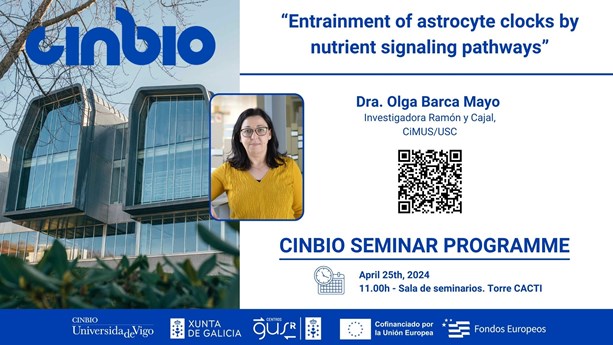Eventos
O xoves 25 de abril de 2024 a Dra. Olga Barca Mayo (Investigadora Ramón y Cajal, CiMUS/USC) ofrecerá o seminario "Entrainment of astrocyte clocks by nutrient signaling pathways", dentro do ciclo "CINBIO Seminar Programme".
Será ás 11:00h na Sala de seminarios de Torre CACTI.

ABSTRACT:
In mammals, endogenous circadian clocks sense and respond to daily feeding and lighting cues, adjusting internal ∼24 h rhythms to resonate with, and anticipate, external cycles of day and night. This ensures a temporal partitioning of catabolic and anabolic reactions synchronizing organism metabolism to the feeding-fasting cycle. The mechanism underlying circadian entrainment to feeding time is critical for understanding why mistimed feeding, as occurs during shift work, disrupts circadian physiology, a state associated with increased incidence of chronic diseases such as type 2 diabetes. Metabolic state sensing pathways can alter the molecular clock in anticipation of the environmental light-dark cycles. During feeding, anabolic processes are triggered by the activation of the Insulin (INS)-AKT-mTOR signaling pathway. On the other hand, during fasting, AMPK activation triggers catabolic processes and inhibits mTOR activity. As astrocytes are at the interface between vessels and neurons, they are in a privileged position to act as metabolic sensors of systemic cues that entrain the peripheral clocks linking the periphery and brain clocks. Here, we will discuss the role of INS and AMPK signaling pathways in the entrainment of astrocyte clocks and their impact in regulating daily rhythms in physiology and behavio.
BIO:
Olga Barca obtained her PhD in Neuroendocrinology at the Department of Physiology (University of Santiago de Compostela, Spain) in 2008. After obtaining her PhD degree, she moved as post-doc to the Laboratory of Dr Roy Weiss and Dr Samuel Refetoff, at the Department of Medicine of the University of Chicago where she focused on endocrinology and metabolism in physiological and pathological conditions. The long-term interest in neuroscience and neurophysiology prompted her to pursue a second Post-doc experience and in (2011) she moved to the laboratory of Dr Richard Lu at the Developmental Department in UTSW (Dallas, Texas) to investigate glia development and physiology.
In 2013, she moved as a senior Post Doc at the Neurobiology of miRNAs and IIT-NetS3 laboratories at the Dpt. of Neuroscience and Brain Technologies (Fondazione Istituto Italiano di Tecnologia (IIT, Genova, Italy). At IIT, she was awarded with two Marie Curie Fellowships (CIG and IEF) to explore the contribution of astrocyte circadian rhythms ("astroclock") to the timekeeping system. Two years later, in 2015, she was awarded with a Cariplo Research Grant to explore the role of "astroclock" in diseases associated with altered circadian rhythms, such as metabolic and age-associated neuropathology.
In 2020 she established his group at the Center for Research in Molecular Medicine and Chronic Diseases (CiMUS, Spain) as a Ramón y Cajal researcher.





